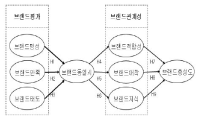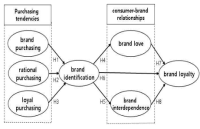
This study is aimed at identifying the relationship among brand evaluation, brand identification, brand relationship, and brand loyalty towards professional baseball title sponsors in an empirical manner. The target of this study is 'Korea Yakult,' a baseball title sponsor in 2014. A survey was conducted on 377 home crowd members of Nexen, Doosan, LG and SK based in metropolitan regions. Sampling method was Convenience Sampling Mode, and questionnaire has been structured to be self-administerd type. SPSSWIN Ver. 21.0 and AMOS 18.0 have been used for data processing. The findings are as follows. First, the brand reputation had a significant impact on brand identification. Second, the brand satisfaction had no significant impact on brand identification. Third, the brand attitude had a significant impact on brand identification. Fourth, the brand identification had a significant impact on brand suitability. Fifth, the brand identification had a significant impact on brand attachment. Sixth, the brand identification had a significant impact on brand knowledge. Seventh, the brand suitability had a significant impact on brand loyalty. Eighth, the brand attachment had a significant impact on brand loyalty. Ninth, the brand knowledge had a significant impact on brand loyalty.


The purpose of this study was to investigate the relationships among purchasing tendencies, brand identification, consumer-brand relationships, and brand loyalty by analyzing structural equation model. A survey was conducted by using members(n=220) of 8 sport clubs located in Chungcheong Province. The data were recorded and analyzed using the SPSSWIN Ver. 21.0 and AMOS 18.0 to analyze the structural equation model. The findings of this study were as follows: First, brand purchasing had a significantly negative effect on brand identification. Second, rational purchasing was found to impact significantly on brand identification. Third, loyal purchasing did not show significant impact on brand identification. Firth, brand identification was found to significantly influence on brand love, brand interdependence, and brand loyalty. Fifth, brand love had no positive impact on brand loyalty. Finally, interdependence was found to impact significantly and positively on brand loyalty.


The purpose of this study was twofold: 1) to investigate the structural relationship among the variables interested, and 2) provide rationale for professional sport team parent companies for operating and managing professional sport teams. Using convenience sampling method, data was collected at a professional soccer match held in Suwon World Cup Stadium through survey distribution. Collected data were analyzed using SPSS 20 and AMOS 20. The results derived through multiple steps of data analysis displayed that community attachment and team image significantly affected team identification. Moreover, team identification affected parent company image, parent company image affected parent company product image, and parent company product image affected purchase and WOM intention. As a result it was found that for parent companies, operating and managing a professional sport team not only provide intangible benefits such as brand awareness and brand image, but also economical benefits such as increase in product sales through improved company product image.
